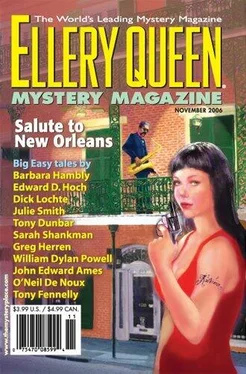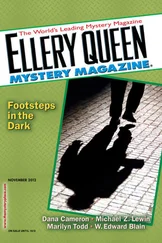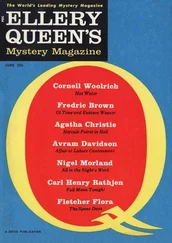John Ames - Ellery Queen's Mystery Magazine, Vol. 128, No. 5. Whole No. 783, November 2006
Здесь есть возможность читать онлайн «John Ames - Ellery Queen's Mystery Magazine, Vol. 128, No. 5. Whole No. 783, November 2006» весь текст электронной книги совершенно бесплатно (целиком полную версию без сокращений). В некоторых случаях можно слушать аудио, скачать через торрент в формате fb2 и присутствует краткое содержание. Город: New York, Год выпуска: 2006, ISBN: 2006, Издательство: Dell Magazines, Жанр: Детектив, на английском языке. Описание произведения, (предисловие) а так же отзывы посетителей доступны на портале библиотеки ЛибКат.
- Название:Ellery Queen's Mystery Magazine, Vol. 128, No. 5. Whole No. 783, November 2006
- Автор:
- Издательство:Dell Magazines
- Жанр:
- Год:2006
- Город:New York
- ISBN:ISSN 0013-6328
- Рейтинг книги:5 / 5. Голосов: 1
-
Избранное:Добавить в избранное
- Отзывы:
-
Ваша оценка:
- 100
- 1
- 2
- 3
- 4
- 5
Ellery Queen's Mystery Magazine, Vol. 128, No. 5. Whole No. 783, November 2006: краткое содержание, описание и аннотация
Предлагаем к чтению аннотацию, описание, краткое содержание или предисловие (зависит от того, что написал сам автор книги «Ellery Queen's Mystery Magazine, Vol. 128, No. 5. Whole No. 783, November 2006»). Если вы не нашли необходимую информацию о книге — напишите в комментариях, мы постараемся отыскать её.
Ellery Queen's Mystery Magazine, Vol. 128, No. 5. Whole No. 783, November 2006 — читать онлайн бесплатно полную книгу (весь текст) целиком
Ниже представлен текст книги, разбитый по страницам. Система сохранения места последней прочитанной страницы, позволяет с удобством читать онлайн бесплатно книгу «Ellery Queen's Mystery Magazine, Vol. 128, No. 5. Whole No. 783, November 2006», без необходимости каждый раз заново искать на чём Вы остановились. Поставьте закладку, и сможете в любой момент перейти на страницу, на которой закончили чтение.
Интервал:
Закладка:
“He’d better be,” Jason said, suddenly aware of our discussion.
“You both are askin’ the wrong man,” Tom said. “Ah’m just the playwright, the last to know.”
“I gave up my job at the lounge,” Jason said. “Harmon better be playing straight.”
“Did you like slingin’ drinks?” Tom asked.
“It was okay.”
“Was it as satisfyin’ as acting?”
“Hell, no.”
“Then whatever happens, Harmon did you a favor.”
Jason begrudgingly admitted this was true.
He held out a well-thumbed trade paperback of An Actor Prepares. “I’d like this,” he said.
Tom took out his wallet, but I told him to put it away. “It’s just a reader copy.”
“That’s very sweet of you, Harol’,” he said. “We’re off to The Absinthe House for cocktails. Love to have you join us.”
I thanked him, but declined. Three was a crowd and booze was something else I’d left behind in the ‘sixties.
“Till the big night, then,” Tom said.
The Saenger Theatre has stood on the corner of Canal and Rampart since the ‘twenties, when, after a three-year period of careful construction (at a cost of $2.5 million), it emerged as the city’s leading home for silent films and stage plays. In the ‘thirties, talking movies became its sole attractions.
They remained so until the mid ‘sixties, when a renovation, partially financed by the sale of eleven of the building’s original twelve stunning chandeliers, transported from a vacation spot for French royalty near Versailles, resulted in a “piggy-back” theater. A wall transformed the balcony into a cinema, while the ground floor served as a 2,700-seat venue for touring theatricals.
That Saturday evening, it was standing-room only. The idea of being present on opening night of a Tennessee Williams play, directed by and starring the near-legendary Harmon Kane, with the playwright himself in attendance, was almost too much for New Orleans’ social- and literary-minded citizens to handle. They arrived in force, dressed to the nines.
And, judging by their cheers as the curtain descended on Eugenia Broussard’s Maggie and Jason Dupuis’ Brick facing an uncertain future, they enjoyed the play as much as I did.
“You’ve got a hit,” I said to Megan.
She was never less than lovely, but her smile that night turned her transcendent. “I think you’re right. Harold, I’m going to have a play on Broadway.”
The members of the large cast assembled for their curtain calls. After considerable clapping and bravo s, the actors portraying the house servants and the “little no-neck monster” children curtsied and left the stage, followed by the show’s unctuous Reverend Tooker (a life-insurance salesman named Carl Godet) and the brusque Doctor Baugh (New Orleans Recreational Department’s Sam Gottfried).
Next to exit were Jacques Boudreaux (a druggist who appeared frequently in local stage productions) and Felicia Martinez (the hostess of a children’s show on WWL-TV) who had appeared as Big Daddy’s mendacious son Gooper and his tart-tongued wife Mae.
Before their departure, the production’s credible Big Mama, Mildred St. Paul, another frequently used local thespian and the housewife of a vice president at Henderson Petroleum, and Jason Dupuis (Brick), were given standing ovations that they almost deserved. That left the stage to the elephantine Harmon Kane, who, with surprising grace, gathered Eugenia Broussard in one massive arm and pulled her close, both of them regarding the standing, cheering crowd with an air of noblesse oblige.
When the applause began to wane, Harmon turned to the wings and summoned the other two primary players — “Millie and Jack” — to rejoin them.
More applause.
A young man in an ill-fitting tuxedo raced down the aisle bearing two rose bouquets that Harmon presented to Eugenia Broussard and Mildred St. Paul. Then Harmon stepped toward the footlights and gestured the crowd to quiet down.
“Ladies and gentlemen,” he said, his magnificent voice rumbling effortlessly without benefit of amplification, “we would like to thank you for your warm and enthusiastic response to our little production.”
The audience was silent now and a bit mesmerized.
“I, myself, am particularly in your debt,” he continued. “Since I have been absent from the theater for nearly twenty years, laboring in the Hollywood vineyards, there were some who needed assurance that I had not lost my... flair for stagecraft.
“Tonight your applause has given them all the proof anyone would need. As a result, on Broadway this fall, I will be directing a new play by a promising young writer named David Mamet, starring myself and Mr. Kenneth McMillan.
“Until then, I remain your humble servant in the arts.”
More applause.
But Harmon’s cast members didn’t seem to be sharing his good spirits as they took their final bows and the curtain descended.
“He had no intention of bringing this production to Broadway,” Megan said, her eyes wet with tears. “We were just a test case. How could he be so cruel?”
Tom, standing in the aisle a few rows from the stage, saw her and began to thread his way toward us. With the crowd of theatergoers jabbering and calling his name, he took Megan’s hand and said, “I’m so sorry, my deah.”
She drew a deep breath and when she exhaled her unhappiness seemed to disappear, replaced by a determination that hardened her beauty in a way I’d never seen before. “Did you know what he was planning, Tom?”
“Not until I saw Mr. Edgar Weisman in the seventh-row aisle seat.”
“Who’s he?” I asked.
“A representative of Greystone Theaters,” Tom said. “They operate the Waterford on 47th and Broadway, which I assume is where Harmon will appear in his ‘promising’ young playwright’s bit of twaddle.”
“I’d better get backstage,” Megan said. “Those poor actors must be terribly depressed. I want to make sure they’re still coming to the party. After all their hard work, the least I can do is provide them with food and drink and the opportunity to tell the loathsome Mr. Kane precisely what they think of him.”
We both watched her maneuver through the crowd.
“After dropping that bombshell, you don’t suppose Kane really will show at the party?” I asked.
“’Course he will, Harol’. He’s got to get another five performances out of those poor disillusioned actors and he’s a big enough ham to think he can talk them into it.”
“You theater folk,” I said, prompting one of his cackles. “I suppose you’ll be at the party?”
“As things stand, I wouldn’t miss it,” he said, turning to the crowd of men and women offering him pens and playbills to sign.
Megan’s cast party was being held in a penthouse suite at the Royal Orleans Hotel that probably cost about the same per night as a month’s rent of my bookshop three blocks down the street. A bar had been set up, and a groaning board filled with iced shrimp and crawfish, raw oysters, roast beef, a ham, dirty-rice, two kinds of salads, crudités, and tiny hamburgers and little links that were mainly for the children.
She had been successful in corralling most of the cast, though the party proceeded in a subdued and semi-gloomy manner for over an hour without a sign of either Harmon or Eugenia. The children and their stage parents seemed to be enjoying themselves, along with the African-American contingent that had portrayed Big Daddy’s household staff. They’d had no illusions about Broadway, having been informed at the start that their relatively minor roles would be recast by New York actors.
The others were finding it difficult to set aside their sense of betrayal, even with their stomachs full and their wine and cocktail glasses being constantly refilled. Jason Dupuis, suspicious that Tom had been in on the deception, was giving the playwright a hard time of it.
Читать дальшеИнтервал:
Закладка:
Похожие книги на «Ellery Queen's Mystery Magazine, Vol. 128, No. 5. Whole No. 783, November 2006»
Представляем Вашему вниманию похожие книги на «Ellery Queen's Mystery Magazine, Vol. 128, No. 5. Whole No. 783, November 2006» списком для выбора. Мы отобрали схожую по названию и смыслу литературу в надежде предоставить читателям больше вариантов отыскать новые, интересные, ещё непрочитанные произведения.
Обсуждение, отзывы о книге «Ellery Queen's Mystery Magazine, Vol. 128, No. 5. Whole No. 783, November 2006» и просто собственные мнения читателей. Оставьте ваши комментарии, напишите, что Вы думаете о произведении, его смысле или главных героях. Укажите что конкретно понравилось, а что нет, и почему Вы так считаете.












